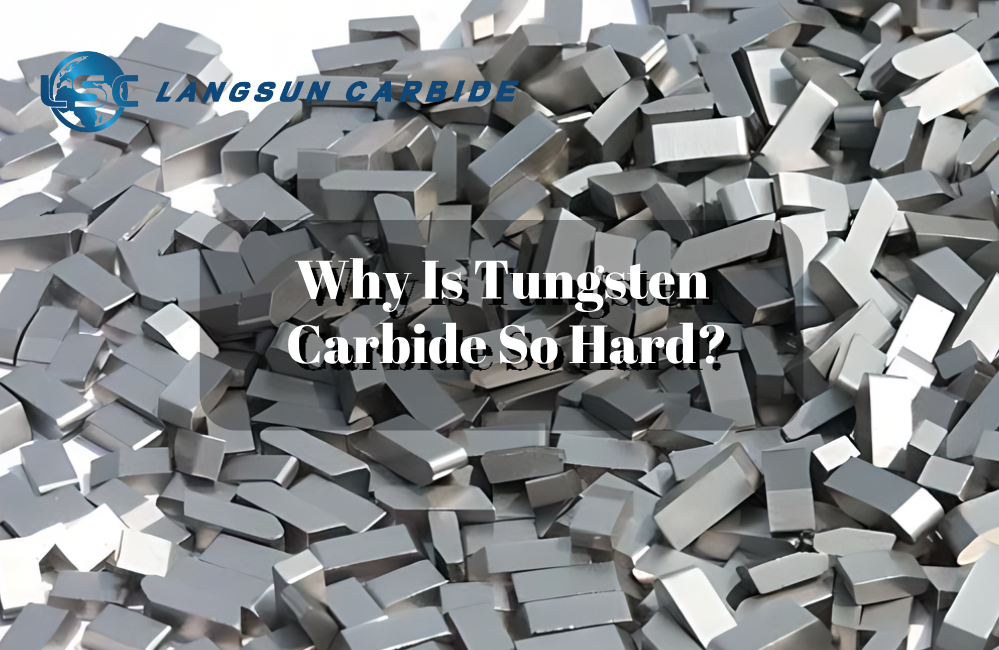In today's world, industrial tools endure relentless wear, impact, and extreme temperatures—material failure is simply unacceptable. Tungsten carbide is celebrated for its exceptional hardness, a property that sets it apart in industrial applications. What endows this material with such legendary durability? We will explore the atomic-level science behind tungsten carbide's hardness.
Hardness is a material's ability to resist deformation, scratching, or penetration. Tungsten carbide's exceptional hardness is attributed to its unique composition and crystalline structure.
● Tungsten and Carbon: Tungsten carbide is a chemical compound consisting of tungsten (W) and carbon (C) atoms. The strong covalent bonds between these atoms are fundamental to its hardness.
● Hexagonal Close-Packed Lattice: Tungsten carbide features a hexagonal close-packed (hcp) crystalline structure. This arrangement maximizes atomic packing efficiency, enhancing hardness by minimizing slip planes where deformation could occur.
● Grain Boundaries: The fine microstructure, characterized by small, uniformly distributed grains, increases hardness by impeding dislocation movement and crack propagation.
Several factors contribute to tungsten carbide's superior hardness:
● Covalent Bonds: The covalent bonds between tungsten and carbon atoms are among the strongest in nature, providing immense resistance to deformation and wear.
● High Atomic Density: Tungsten carbide's high atomic density results in fewer voids and defects, enhancing its hardness and structural integrity.
● Sintering Techniques: Advanced sintering techniques, such as hot isostatic pressing (HIP), further consolidate the material, eliminating porosity and increasing hardness.

Tungsten carbide’s properties make it superior to common alternatives:
| Material | Hardness (Mohs) | Wear Resistance | Limitations |
|---|---|---|---|
| Tungsten Carbide | 9–9.5 | 10–20× steel | Brittle under impact (mitigated with binders) |
| Tool Steel | 5–6 | Baseline | Softens at high temperatures |
| Ceramics | 8–9 | High | Prone to chipping and fracture |
| Titanium | 6 | Low | Unsuitable for heavy abrasion |
● Heat Resistance: Retains hardness up to 1,000°C (1,832°F), unlike steel, which softens at 600°C
● Corrosion Immunity: Resists acids, alkalis, and oxidation, especially with nickel binders
● Compressive Strength: Withstands over 4000 MPa pressure, ideal for drilling and crushing
Tungsten carbide's exceptional hardness offers several advantages in industrial applications:
● Extended Tool Life: Tools and components made from tungsten carbide exhibit superior wear resistance, leading to longer service life and reduced maintenance costs.
● Cutting Tools: The hardness of tungsten carbide allows for the manufacture of cutting tools that maintain sharpness and precision, enhancing efficiency and accuracy in machining processes.
● Durability in Harsh Environments: Tungsten carbide's hardness ensures durability and reliability in demanding conditions, such as mining and construction, where tools are subjected to high impact and abrasion.
● Reduced Downtime: The durability of tungsten carbide components minimizes downtime due to maintenance or replacements, offering cost savings and increased productivity.
The exceptional hardness of tungsten carbide products stems from its unique chemical composition, crystal structure, and advanced manufacturing processes. This outstanding property offers significant advantages in industrial applications, including superior wear resistance, enhanced precision, and greater cost-effectiveness. By combining diamond-like hardness (9-9.5 on the Mohs scale) with exceptional toughness imparted by cobalt/nickel binders, tungsten carbide overcomes challenges other materials struggle with: maintaining sharpness under extreme temperatures, resisting wear in rock formations, and withstanding chemical corrosion.
As industries pursue greater efficiency and extended component lifespans, manufacturing techniques for tungsten carbide products continue to evolve. Langsun Carbide remains at the forefront of the industry, delivering customized tungsten carbide solutions to meet the most demanding operational challenges worldwide.